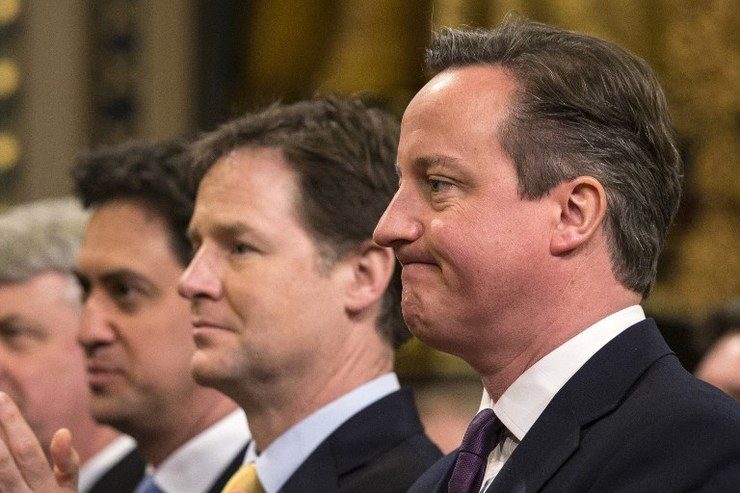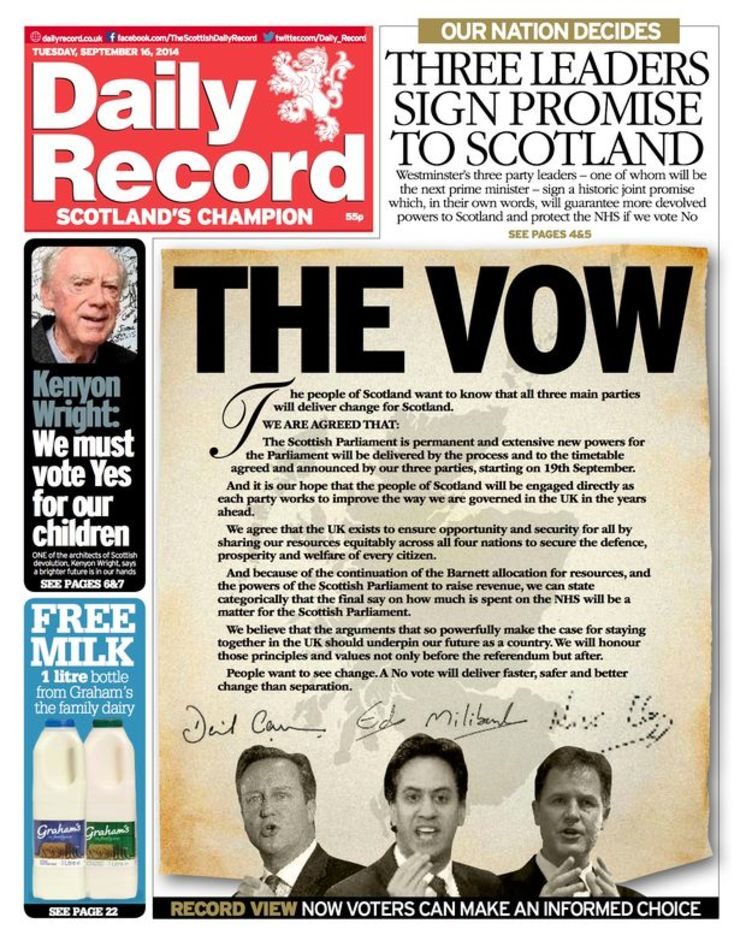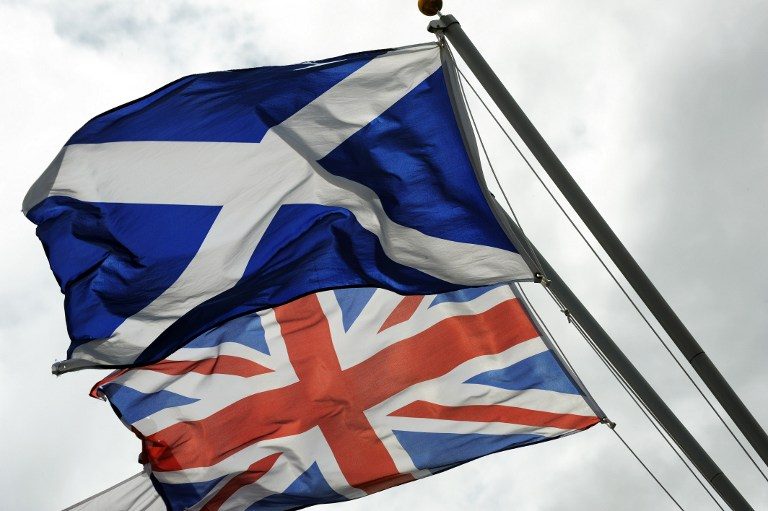SUMMARY
This is AI generated summarization, which may have errors. For context, always refer to the full article.

ABERDEEN, United Kingdom – The leaders of the three main British parties on Tuesday, September 16, issued a joint pledge to give the Scottish parliament more powers if voters reject independence, in a final drive to stop the United Kingdom splitting.
The promise, which reiterates previous commitments, appeared on the front page of leading Scottish newspaper the Daily Record under the headline “The vow”.
Its appearance comes two days ahead of Scotland’s independence referendum on Thursday, September 18.
Printed to look like a yellowed scroll, the promise was signed by Conservative Prime Minister David Cameron, opposition Labour party leader Ed Miliband, and Liberal Democrat deputy Prime Minister Nick Clegg.
“We agreed that: The Scottish Parliament is permanent and extensive new powers for the Parliament will be delivered,” the text read.

“People want to see change. A No vote will deliver faster, safer and better change than separation.”
It reaffirmed a timetable for new powers announced by the three leaders last week, after polls showed a late surge in support for independence, putting the outcome on a knife edge
“It’s clear that project panic is willing to say anything in the last few days of the campaign to try to halt the Yes momentum,” a spokesman for the pro-independence campaign said.
“The reality is that the only way to guarantee Scotland gets all the powers we need…is with a Yes vote on Thursday.”
No going back
The pledge was published after a last minute trip to Scotland by Cameron to urge Scots to vote against independence or face dire consequences, in what could be his last visit to Scotland before the vote.
“Head, heart and soul, we want you to stay,” Cameron said to applause from a mostly elderly audience of hundreds of people who were bussed in for the event in Aberdeen, a city that is a hub for Scotland’s offshore oil and gas industry.
“Independence would not be a trial separation, it would be a painful divorce,” he said, warning of a risk to pensions and the difficulties of a physical border.
“There is no going back from this,” he said.
Back in London, thousands rallied to plead with Scotland to stay in the union, waving union jack flags and holding signs such as “Scotland we love you, don’t go” in a rally in central Trafalgar Square.
SCOTLAND DECIDES
On 18 September 2014, Scotland’s 4 million voters will head to the polls and answer this question: “Should Scotland Be An Independent Country?”
“We think that unity is better than division, and cooperation is better than competition,” organizer Dan Snow, a broadcaster and historian, told the crowd.
Three surveys published over the weekend put the pro-union campaign ahead by varying margins: 47% for “No” to 40.8% for “Yes” in a poll by Survation; 47.7 to 42.3% in an Opinium survey; and 47.1 to 46.1% in a Panelbase poll.
An ICM online poll for The Sunday Telegraph newspaper however gave the “Yes” camp 49%, ahead of the pro-UK camp at 42% with 9.0% undecided, although pollsters warned the sample size could be too small to be representative.
‘Strong, robust and united’
With polls showing an extremely tight vote on Thursday, campaigners for and against keeping Scotland in the United Kingdom pulled out all the stops, with English football icon David Beckham declaring support for the “Better Together” camp.
Ron Fowlie, a 73-year-old pro-independence activist who was handing out leaflets in Aberdeen’s city center on Monday, September 15, dismissed the pressure to keep the United Kingdom together.
He said he was “confident” of victory and stated: “We would like to run our own country.”
Gilliam Wanterbberin, 39, who attended Cameron’s speech, was more sympathetic to the pro-unity stance. “He’s done a good thing in coming here and not staying in London,” he said.
Economists disagree about the consequences of a split, with Nobel Prize winner Joseph Stiglitz describing warnings as “fear-mongering” but fellow Nobel laureate and New York Times columnist Paul Krugman cautioning of “huge risks”.
In a meeting with business leaders who support independence, Scotland’s pro-independence first minister, Alex Salmond, accused Cameron of “orchestration” in getting businesses to support a “No” vote.
“This is about creating a more prosperous Scotland but also about creating a fairer society,” Salmond said.
“People have got a once-in-a-lifetime opportunity in three days’ time to put Scotland’s future in Scotland’s hands.” – With Naomi O’Leary in London, Agence France-Presse/Rappler.com
Add a comment
How does this make you feel?

There are no comments yet. Add your comment to start the conversation.